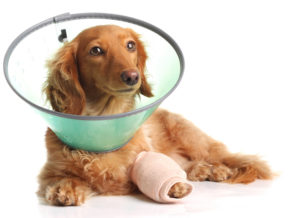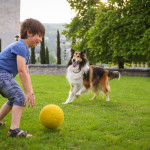
As anyone who owns one knows, Dachshunds are energetic, fun-loving dogs with an independent (and sometimes stubborn) streak. Seeming to possess almost limitless supplies of energy, it can be hard to tell when your dog is feeling a bit off. So that you’ve got a better idea of what to look out for, here are five common Dachshund health problems:
1. Intervertebral Disc Disease
With their long bodies and short legs, Dachshunds are genetically prone to several musculoskeletal conditions. The most serious of these is intervertebral disc disease, which causes the vertebrae to weaken and possibly protrude into the spinal canal. You can help reduce the potential for spinal stress by:
- Maintaining your dog at a healthy weight with a well-balanced diet;
- Discouraging your dog from jumping off furniture or regularly travelling up and down flights of stairs; and
- Supporting your dog when holding them to keep the spine horizontal.
Symptoms may include limping or lameness, a reluctance to play, or yelping when receiving pats. If your Dachshund shows any of these symptoms, consult your vet immediately. Mild cases may be treated with anti-inflammatories, while more severe cases may require surgery.
2. Patella Luxation
Patella Luxation (loose knees) occurs when your dog’s knee cap pops out from its groove. Dachshunds are more likely to develop this condition given their short legs (which changes the angle of their kneecap). Preventative measures to help reduce the likelihood of this disease include:
- Maintaining your dog at a healthy weight;
- Exercising your Dachshund regularly; and
- Boosting your dog’s diet with high quality supplements such as Dig-In Digestive Gravy.
Dogs suffering from this condition may show signs of lameness such as limping, or favouring one leg. In cases of suspected Patella Luxation, your vet will perform a physical examination, and if confirmed, the condition is often treated surgically.
3. Hip Dysplasia
This condition is caused by a deformity of the hip joint, where the thigh bone doesn’t properly fit into the socket, and may lead to rear leg lameness.
You can help reduce the likelihood of hip dysplasia by feeding your dog a nutritious, healthy diet (supplemented with Dig-In Digestive Gravy), and discouraging your dog from jumping up and down, which increases the load on their back legs. Signs your dog may have hip dysplasia include hind leg lameness, difficulty getting up, and walking unsteadily. If your dog displays any of these symptoms, take your pooch to the vet for a thorough assessment.
4. Eye Issues
Dachshunds can suffer from congenital eye problems such as dry eye, Progressive Retinal Atrophy (PRA), and cataracts. The most serious of these eye conditions is PRA – a degenerative eye disease which may result in blindness. There may be few symptoms of this disease, however some dogs may be reluctant to go downstairs or into dark areas, and their eye lens may look cloudy. Unfortunately, there’s no treatment; but with a little extra care, blind dogs can still live a long and happy life.
Preventative measures you can take to help reduce the incidence of a serious eye condition include keeping your dog’s eyes clean, trimming long hair away from their eyes, and treating any eye infections promptly.
5. Obesity
A well-balanced, whole food based diet combined with regular exercise, are the best ways to prevent your dog from gaining too much weight. By keeping your dog fit and healthy, you’ll help ensure that no additional strain is placed on their spine. Be mindful of any unexpected weight gain as this may indicate a more serious health concern such as hypothyroidism. If your dog starts gaining weight, seems lethargic or easily fatigued, consult with your vet as soon as possible to determine the cause.
While it’s likely your Dachshund will be in great condition their whole life, it’s useful to be able to recognise the signs of common diseases, so you can seek treatment straight away and keep your pooch in the best possible health.
LOOKING FOR A WAY TO KEEP YOUR DACHSHUND HAPPY AND HEALTHY? DON’T FORGET TO GRAB YOUR DIG-IN TODAY – BUY NOW!
Update: Under new legislation that each state government is either enacting or considering, all breeders will be strictly controlled. However, it is best to talk to one of the Dachshund Clubs to find out who are the best breeders.
For more information, the below Australian Breed Standard documents for Dachshunds are provided by the Australian National Kennel Council at and are certainly worth checking in with.
BREED DETAILS
BREED DOWNLOAD PDF
DOGS QUEENSLAND MINIATURE DACHSHUND
NATIONAL DACHSUND ORGANISATION
DACHSUND AUSTRALIA
DACHSUND CLUB AUSTRALIA
DACHSUND QUEENSLAND
Do not rely on the information on our website as an alternative to medical advice from your veterinary doctor. If you think your pet may be suffering from a medical condition, seek immediate medical attention.
References
- Dachshund Owner Guide. Common Dachshund Health Problems, Symptoms, Preventions and Treatments. 2013. Available from: http://www.dachshund-owner-guide.com/dachshund-health-problems.html. 27 November 2016.
- Everything About Dachshunds. Dachshund Health Problems and Precautions. Available from: http://www.everything-about-dachshunds.com/dachshund-health-problems.html. 25 November 2016.
- Dachshund Health Issues. Available from: http://petcha.com/pets/dachshund-health-issues/. 25 November 2016.
- Your PureBred Puppy. Dachshund Health Problems and Raising a Dachshund Puppy to be Healthy. Available from: http://www.yourpurebredpuppy.com/health/dachshunds.html. 27 November 2016.






